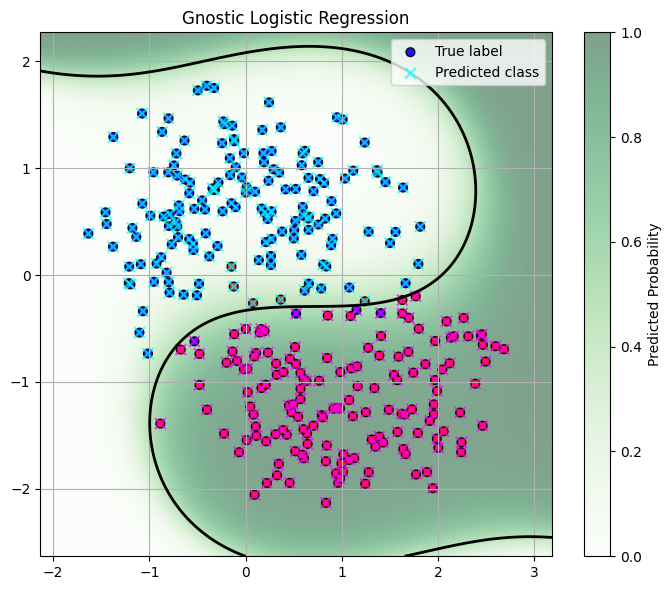LogisticRegressor: Robust Logistic Regression with Machine Gnostics¶
The LogisticRegressor is a robust and flexible binary classification model built on the Machine Gnostics framework. It is designed to handle outliers, heavy-tailed distributions, and non-Gaussian noise, making it suitable for real-world data challenges. The model supports polynomial feature expansion, robust weighting, early stopping, and seamless MLflow integration for experiment tracking and deployment.
Overview¶
Machine Gnostics LogisticRegressor brings deterministic, event-level modeling to binary classification. By leveraging gnostic algebra and geometry, it provides robust, interpretable, and reproducible results, even in challenging scenarios.
Highlights:
- Outlier Robustness: Gnostic weighting reduces the impact of noisy or corrupted samples.
- Polynomial Feature Expansion: Configurable degree for nonlinear decision boundaries.
- Flexible Probability Output: Choose between gnostic-based or standard sigmoid probabilities.
- Early Stopping: Efficient training via monitoring of loss and entropy.
- MLflow Integration: Supports experiment tracking and deployment.
- Model Persistence: Save and load models easily with joblib.
Key Features¶
- Robust to outliers and non-Gaussian noise
- Polynomial feature expansion (configurable degree)
- Flexible probability output: gnostic or sigmoid
- Customizable data scaling (auto or manual)
- Early stopping based on residual entropy or log loss
- Full training history tracking (loss, entropy, coefficients, weights)
- MLflow integration for model tracking and deployment
- Save and load model using joblib
Parameters¶
| Parameter | Type | Default | Description |
|---|---|---|---|
degree |
int | 1 | Degree of the polynomial for feature expansion (1 = linear). |
max_iter |
int | 100 | Maximum number of training iterations. |
tol |
float | 1e-3 | Convergence threshold for loss or coefficient changes. |
scale |
{'auto', float} | 'auto' | Scaling mode for gnostic transformation. |
early_stopping |
bool | True | Enables early stopping based on convergence criteria. |
history |
bool | True | Records training history at each iteration. |
proba |
{'gnostic','sigmoid'} | 'gnostic' | Probability output mode. |
verbose |
bool | False | Prints progress and debug information. |
data_form |
str | 'a' | Input data form: 'a' (additive), 'm' (multiplicative). |
verbose |
bool | True | Print detailed progress, warnings, and results |
Attributes¶
- coefficients:
ndarray
Final learned polynomial regression coefficients. - weights:
ndarray
Final sample weights after convergence. - _history:
list of dict
Training history, including loss, entropy, coefficients, and weights at each iteration.
Methods¶
fit(X, y)¶
Fits the model to training data using polynomial expansion and robust loss minimization.
- X: array-like, pandas.DataFrame, or numpy.ndarray of shape
(n_samples, n_features)
Training input samples. - y: array-like or numpy.ndarray of shape
(n_samples,)
Target binary labels (0 or 1).
Returns:
self (for method chaining)
predict(X)¶
Predicts class labels (0 or 1) for new input samples using the trained model.
- X: array-like, pandas.DataFrame, or numpy.ndarray of shape
(n_samples, n_features)
Input samples for prediction.
Returns:
y_pred: numpy.ndarray of shape (n_samples,)
Predicted binary class labels.
predict_proba(X)¶
Predicts probabilities for new input samples using the trained model.
- X: array-like, pandas.DataFrame, or numpy.ndarray of shape
(n_samples, n_features)
Input samples for probability prediction.
Returns:
proba: numpy.ndarray of shape (n_samples,)
Predicted probabilities for the positive class (label 1).
save_model(path)¶
Saves the trained model to disk using joblib.
- path: str
Directory path to save the model.
load_model(path)¶
Loads a previously saved model from disk.
- path: str
Directory path where the model is saved.
Returns:
Instance of LogisticRegressor with loaded parameters.
Example Usage¶
from machinegnostics.models.classification import LogisticRegressor
# Initialize the model
model = LogisticRegressor(degree=2, proba='gnostic', verbose=True)
# Fit the model
model.fit(X_train, y_train)
# Predict class labels
y_pred = model.predict(X_test)
# Predict probabilities
y_proba = model.predict_proba(X_test)
# Access coefficients and weights
print("Coefficients:", model.coefficients)
print("Weights:", model.weights)
# Save the model
model.save_model("my_logreg_model")
# Load the model
loaded = LogisticRegressor.load_model("my_logreg_model")
y_pred2 = loaded.predict(X_test)
Training History¶
If history=True, the model records training history at each iteration, accessible via model._history. Each entry contains:
iteration: Iteration numberloss: Loss value (gnostic or log loss)entropy: Residual entropy valuecoefficients: Regression coefficients at this iterationweights: Sample weights at this iteration
This enables detailed analysis and visualization of the training process.
Example Notebooks¶

Notes¶
- The model supports numpy arrays, pandas DataFrames, and pyspark DataFrames as input.
- For best results, ensure input features are appropriately scaled and encoded.
- Supports integration with MLflow for experiment tracking and deployment.
Author: Nirmal Parmar
Date: 2025-05-01